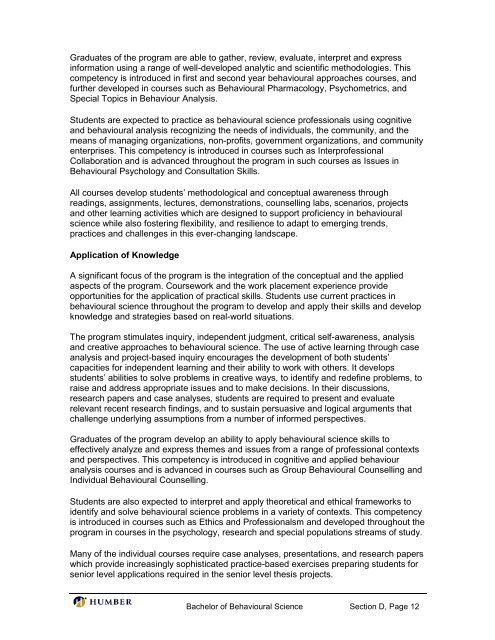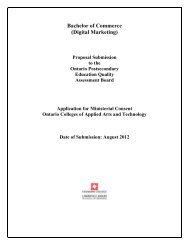Bachelor of Behavioural Science - Postsecondary Education Quality ...
Bachelor of Behavioural Science - Postsecondary Education Quality ...
Bachelor of Behavioural Science - Postsecondary Education Quality ...
Create successful ePaper yourself
Turn your PDF publications into a flip-book with our unique Google optimized e-Paper software.
Graduates <strong>of</strong> the program are able to gather, review, evaluate, interpret and express<br />
information using a range <strong>of</strong> well-developed analytic and scientific methodologies. This<br />
competency is introduced in first and second year behavioural approaches courses, and<br />
further developed in courses such as <strong>Behavioural</strong> Pharmacology, Psychometrics, and<br />
Special Topics in Behaviour Analysis.<br />
Students are expected to practice as behavioural science pr<strong>of</strong>essionals using cognitive<br />
and behavioural analysis recognizing the needs <strong>of</strong> individuals, the community, and the<br />
means <strong>of</strong> managing organizations, non-pr<strong>of</strong>its, government organizations, and community<br />
enterprises. This competency is introduced in courses such as Interpr<strong>of</strong>essional<br />
Collaboration and is advanced throughout the program in such courses as Issues in<br />
<strong>Behavioural</strong> Psychology and Consultation Skills.<br />
All courses develop students‘ methodological and conceptual awareness through<br />
readings, assignments, lectures, demonstrations, counselling labs, scenarios, projects<br />
and other learning activities which are designed to support pr<strong>of</strong>iciency in behavioural<br />
science while also fostering flexibility, and resilience to adapt to emerging trends,<br />
practices and challenges in this ever-changing landscape.<br />
Application <strong>of</strong> Knowledge<br />
A significant focus <strong>of</strong> the program is the integration <strong>of</strong> the conceptual and the applied<br />
aspects <strong>of</strong> the program. Coursework and the work placement experience provide<br />
opportunities for the application <strong>of</strong> practical skills. Students use current practices in<br />
behavioural science throughout the program to develop and apply their skills and develop<br />
knowledge and strategies based on real-world situations.<br />
The program stimulates inquiry, independent judgment, critical self-awareness, analysis<br />
and creative approaches to behavioural science. The use <strong>of</strong> active learning through case<br />
analysis and project-based inquiry encourages the development <strong>of</strong> both students‘<br />
capacities for independent learning and their ability to work with others. It develops<br />
students‘ abilities to solve problems in creative ways, to identify and redefine problems, to<br />
raise and address appropriate issues and to make decisions. In their discussions,<br />
research papers and case analyses, students are required to present and evaluate<br />
relevant recent research findings, and to sustain persuasive and logical arguments that<br />
challenge underlying assumptions from a number <strong>of</strong> informed perspectives.<br />
Graduates <strong>of</strong> the program develop an ability to apply behavioural science skills to<br />
effectively analyze and express themes and issues from a range <strong>of</strong> pr<strong>of</strong>essional contexts<br />
and perspectives. This competency is introduced in cognitive and applied behaviour<br />
analysis courses and is advanced in courses such as Group <strong>Behavioural</strong> Counselling and<br />
Individual <strong>Behavioural</strong> Counselling.<br />
Students are also expected to interpret and apply theoretical and ethical frameworks to<br />
identify and solve behavioural science problems in a variety <strong>of</strong> contexts. This competency<br />
is introduced in courses such as Ethics and Pr<strong>of</strong>essionalsm and developed throughout the<br />
program in courses in the psychology, research and special populations streams <strong>of</strong> study.<br />
Many <strong>of</strong> the individual courses require case analyses, presentations, and research papers<br />
which provide increasingly sophisticated practice-based exercises preparing students for<br />
senior level applications required in the senior level thesis projects.<br />
<strong>Bachelor</strong> <strong>of</strong> <strong>Behavioural</strong> <strong>Science</strong> Section D, Page 12
















